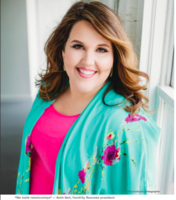One of the most difficult things to get kids to do with an allowance is save it. If you give your kids their money in cash, it's really easy for that cash to “burn a hole” in their pocket and be immediately spent on candy, movie tickets, downloads and games, or impulse items at any store checkout line.
Another challenge parents must overcome when teaching kids about money is the distance between their money and themselves. Letting go of cash is one thing. You can see the money leaving your hand as you get some good or service in exchange. However, when you swipe a plastic card, the distance between spender and money increases even more. It's much easier to be impulsive in those instances, and kids without real-life skills in managing money this way can be quickly overwhelmed, leading to overdraft fees and troubled credit scenarios.
So, how do you teach your child some of the most fundamental personal finance skills they need to learn? Why not become a Personal Banker yourself?
The "First Parental Credit Union" of your house will happily hold money earned for chores, birthday and holiday gifts, and other funds your child may receive throughout the year. Kids can make withdrawals for purchases when they need to, which also allows you to know how your kids manage their money. If you want to encourage savings, you might even offer to pay an interest rate on their savings. Remember, you’re not just the Personal Banker of “First Parental Credit Union,” you are also the President!
So, how do you teach your child some of the most fundamental personal finance skills they need to learn? Why not become a Personal Banker yourself?
The "First Parental Credit Union" of your house will happily hold money earned for chores, birthday and holiday gifts, and other funds your child may receive throughout the year. Kids can make withdrawals for purchases when they need to, which also allows you to know how your kids manage their money. If you want to encourage savings, you might even offer to pay an interest rate on their savings. Remember, you’re not just the Personal Banker of “First Parental Credit Union,” you are also the President!
Keeping track of their account balance should be largely their responsibility. The method can be as simple as a piece of graph paper on the refrigerator or as complex as a shared online spreadsheet. You could even create an actual passbook online and let your child design a custom logo! Each entry should include amount, date, and memo, just like a real checkbook register. This practice can give them invaluable experience balancing a checkbook and appreciating the reality of digital funds. Keeping track of their spending habits also gives you a common frame of reference when it comes to discussing a budget and spending plan with your child.
Using a basic passbook or check register is an easy way to teach money management and responsibility without radically changing the way you and your kids relate to money. It'ss a no-risk option to get on the same page with your child for financial matters, while also having fun.

Visit www.freedomfirstcu.com for more banking tips and advice.


